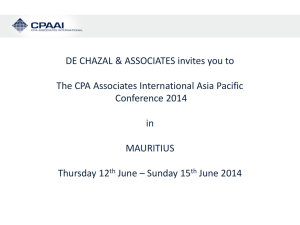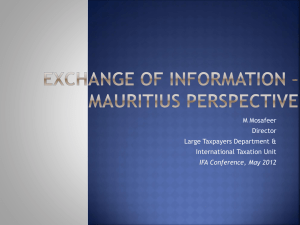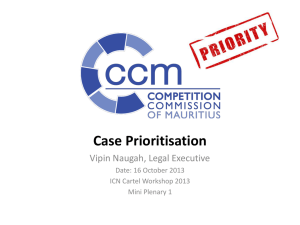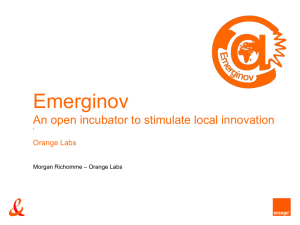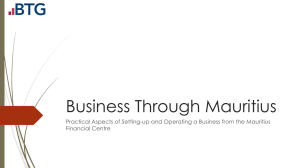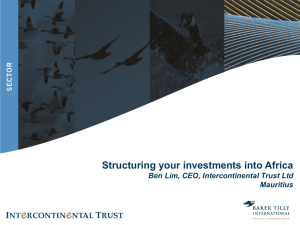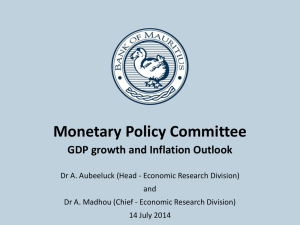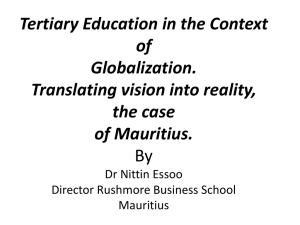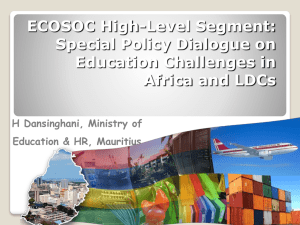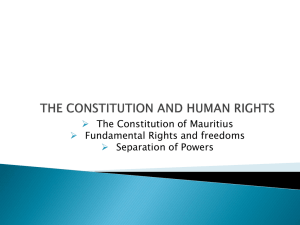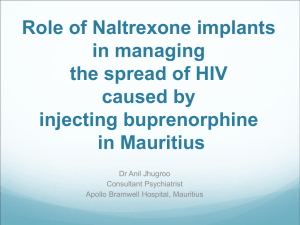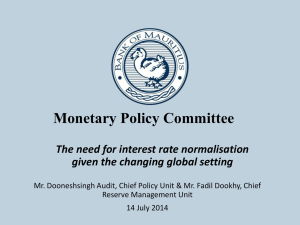Living & Working In Mauritius
advertisement
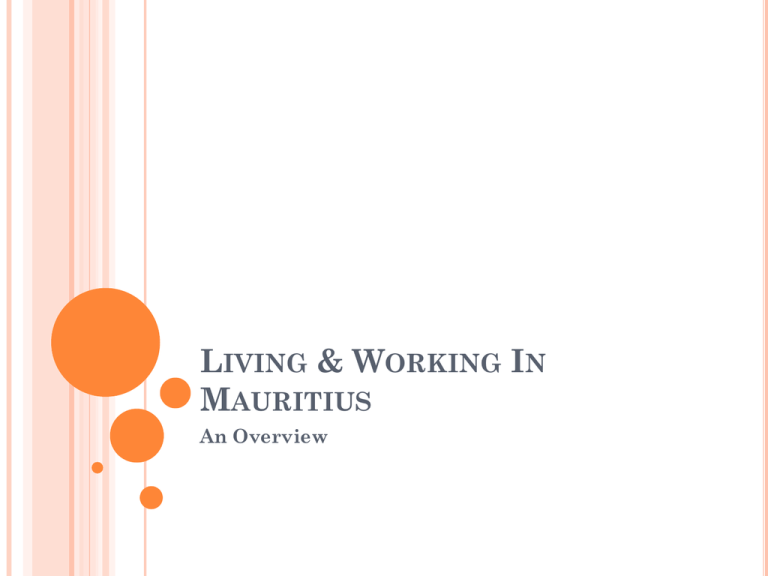
LIVING & WORKING IN MAURITIUS An Overview AREAS OF DISCUSSION... Where is Mauritius? Population/culture/religion/language Services Driving and Transport Where to live? – The property market Working conditions Lifestyle and Leisure Questions & open discussion WHERE IS MAURITIUS? About 2400km off the South East Coast of Africa. It is a relatively small island 1865sqkm in area. HOW FAR FROM.... Mauritius has one airport, the Sir Seewoosagur Ramgoolam International airport, situated in the south east of the island. Some of the major airlines using the airport include Emirates, Air Mauritius, British Airways, Air France and South African airways. A full list and destinations can be found at http://aml.mru.aero/index.php. Flight times are approx. 6hrs to Dubai and 11.5hrs to London. ABOUT MAURITIUS Capital city: Port Louis (North West of Island) Population: approx 1.2million. Language: Officially English, French is widely spoken and is the main language of the media, Creole is spoken by most. Other languages widely spoken include Hindi, Mandarin and Urdu. Major religions: Hindu (about 48%), Muslim (about 17%) , Catholic (about 23%). ABOUT MAURITIUS Currency Mauritian Rupees (1USD=MUR31.5) Time zone GMT+4 Climate – tropical. Winters (May-October) temperatures around 25°C, Summer (NovemberApril) temperatures around 30°C. Most rainfall Jan/Feb which can bring cyclonic activity. Microclimate, central plateau area much cooler than costal regions. ABOUT MAURITIUS The Republic of Mauritius is a parliamentary democracy based on the English system. The President is the head of state and the Prime Minister has full executive powers and is the head of the government. The legal system is a mixture of English common law and French Napoleonic code. The Privy council London is the Supreme Court of Appeal. Mauritius is a member of the Commonwealth. PROPERTY Most popular areas with expat communities are the northern costal areas of Grand Baie and Pereybere and the West coast areas of the Black River. The Northern coast is more convenient if working in the North or Port Louis. The West coast is more convenient for the newly constructed cyber city. BUYING Non-Mauritian citizens can only buy property in projects called IRS or RES. These projects have been granted a special licence to sell to nonMauritians. PROPERTY IRS/RES – what does it mean? IRS: Intergrated resort scheme. Luxury housing available to international buyers. Buyer and immediate family are granted a residence permit and right to work in Mauritius for as long as the property is held. Minimum investment is 500,000USD. RES: Real Estate scheme. Similar to the IRS scheme but generally smaller projects and slightly cheaper property. Does not give the buyer automatic residency status in Mauritius. No minimum investment/purchase price but in reality the properties are still priced well above that of non-RES property. RENTING Property can be easily rented throughout the island on short- and long-term contracts. Standard commission payable to an agent finding you a property is 1 months rent on signing of the contract. Commission sometimes varies especially for shortterm contracts and fees should always be checked with the individual agent before signing any contract. A rough price guide is as follows: 1-2bedroom apartment in coastal area: Rs10,000 20,000/month. 3 bedroom house in coastal area: Rs20,000 30,000/month 4-5 bedroom luxury family home: Rs50,000 80,000/month Beachfront house: Rs80,000 upwards. RENTING – AN EXAMPLE A typical 3 bedroom Mauritian house in Pereybere, a popular area of the north coast. Rents at Rs25,000/month. WORKING CONDITIONS Usual office hours 9am-5pm Monday-Friday. Common practice for companies with overseas clients to keep different hours depending on the client location. Banks on the whole open 8am-3pm. Shops generally open 8-9am-6pm and Saturday mornings. Some shops close Thursday afternoon. Large hypermarkets open extended hours. Employment legislation in place covering workers rights to holidays and sick leave. SERVICES Banks: for personal banking include Barclays, Mauritius Commercial Bank, State Bank, Standard bank, AFRASIA. Telecommunications: Mauritius telecom providing landline connections and internet. Internet 2MB. Mobile operators include Orange & Emtel, most people have pay-as-you go mobiles. Schools: Free primary and secondary education. Mauritius has its own university. Good international schools also available both English and French. Highest adult literacy rates in Africa. Health Care: free health care system. Private clinics such the new Apollo Bramwell hospital in Reduit (central Mauritius) are of a very high standard. Media: State owned broadcasting channels (MBC), many satellite TV options available such as the French ‘Canal Plus’ and South African ‘DSTV’. Many independent radio stations such as Radis Plus and Top FM. Many independent daily and weekly newspapers in French and English. SCHOOLS There are excellent international schools in Mauritius. The most popular ones being: Northfields – English system school based in Labordonnais, North Mauritius. Ecole du Nord – French system school based in Labordonnais, North Mauritius. Le Bocage – English system school based in Moka, Central Mauritius. DRIVING & TRANSPORT Driving follows the British system. Drive on the left. Public transport is restricted to buses and taxis. Buses do operate a good network over the island. Petrol/Diesel prices are government controlled so all filling stations charge the same per litre rate. Current diesel rate approx. Rs45/litre. Current petrol rate approx. Rs40/litre. LIFESTYLE & LEISURE Beach culture. All of Mauritius is within about 20-30min drive of a beach and spending time at the beach is one of the most common leisure activities in Mauritius. Good range of restaurants, bars and clubs especially in coastal regions. Prices very favourable compared to Dubai and many European countries. Shopping and availability of goods is still limited compared with Dubai and many other countries but is fast improving with several shopping malls starting to open throughout the island. Sports: Gyms opening up across the island. 2 very good gyms in the Northern coastal region around Grand Baie. Other popular sports aside from beach-based water sports are: horse racing, cycling, tennis and football (with great interest in the English premiership). Generally life is laid back – don’t be stressed if things aren’t done instantly, you’ll get used to it and everything will get done in the end!
